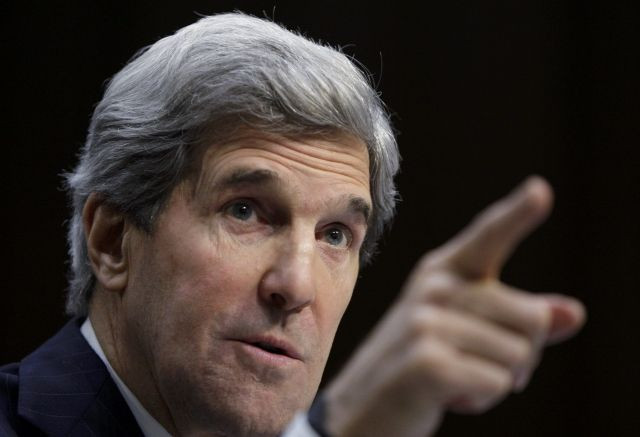John Kerry Warns North Korea Of ‘Consequences’ Against ‘Provocative Behavior’

U.S. Secretary of State John Kerry on Monday warned North Korea against pursuing nuclear ambitions, following telephone talks with his South Korean and Japanese counterparts the previous day.
Kerry joined with South Korean Foreign Minister Kim Sung-hwan to warn Pyongyang of “further consequences” if it continued its “provocative behavior.”
Kerry’s 30-minute talk with Japan’s Foreign Minister, Fumio Kishida, emphasized the warning, which appeared to indicate that Washington, Seoul and Tokyo would seek additional sanctions against Pyongyang if it goes ahead with its third nuclear test.
Pyongyang issued a memorandum on Jan. 14 vowing to bolster its defenses as a measure to “actively contribute to peace and stability in the Korean peninsula and in the rest of Asia,” alleging that Washington’s “aggressive” Asia-Pacific strategy is the cause of tensions in the region.
North Korea’s previous nuclear tests -- in 2006 and 2009 -- were carried out within months of long-range rocket launches.
Over the past week, Pyongyang issued a series of warnings threatening action over the sanctions.
However, Kerry’s warning, which immediately followed his swearing in on Friday, is a departure from his earlier stance that the U.S. engagement with the reclusive Asian nation should focus on intermediate objectives such as recommencement of humanitarian aid and bilateral negotiations aimed at thwarting Pyongyang’s nuclear weapons development.
In a commentary for the Los Angeles Times in June 2011, Kerry discredited Washington’s approach toward Pyongyang.
“Our current approach of strong sanctions and intense coordination with South Korea and Japan does not provide sufficient leverage to stabilize the situation, much less bring about a change in North Korean behavior,” Kerry wrote.
During a U.S. Senate Foreign Relations Committee hearing in March 2011, Kerry said: “We all have grown weary of North Korea’s brinksmanship -- a habit of ratcheting up tensions, followed by suggestions of ways to negotiate back from the brink, followed by concessions, and a repetition of the process. We need to break this cycle. We need to seize the initiative.”
Six-party talks, which began in August 2003, aim to end North Korea's nuclear program through a negotiation process involving the U.S., China, the Koreas, Japan and Russia. The negotiations, however, have long been marred by diplomatic standoffs among the participating states -- particularly between the U.S. and North Korea.
In a statement issued on Jan. 23, Pyongyang had vowed to strengthen its "nuclear deterrence,” saying it would not hold any more talks on the "denuclearization" of the Korean Peninsula.
© Copyright IBTimes 2024. All rights reserved.





















